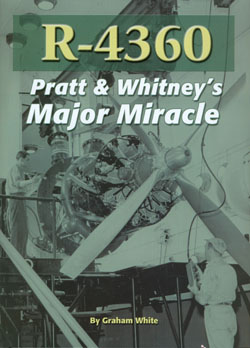 R-4360:
Pratt & Whitney’s Major Miracle R-4360:
Pratt & Whitney’s Major Miracle
By Graham White
Specialty Press, ©2006
ISBN 1-58007-097-3
Hardbound, 608 Pages
When researching a particular aircraft, most texts include
a small section on the engine. This might include some basic data, perhaps
a couple photos showing its layout, and maybe a table showing a few of
the other aircraft that used the same engine. For those who want more,
though, often the books are lacking. This latest title from Specialty
Press goes to the other extreme. With over 600 pages in this massive book,
I cannot imagine that there is anything missing from this text on the
equally massive R-4360.
The R-4360 has the distinction of being the largest aircraft piston
engine produced in the United States. Its basic arrangement is a four-row
28-cylinder engine capable of producing between 3000 and 4000 horsepower,
while weighing in at around 3500 pounds. Both commercial and military
aircraft used this engine, which, while developed during the Second World
War, was too late to see combat in that struggle. The list of aircraft
that used this engine is impressive and includes the Goodyear F2G Corsair,
the Martin JRM-2 Mars and AM-1 Mauler, the Hughes Spruce Goose, the Northrop
B-35, the Convair B-36, the Boeing B-50 and C-97 (and its civil 377 derivative),
and the Douglas C-124, along with many post-war racing planes. With nearly
19,000 built in its eleven year production run, the R-4360 was truly an
impressive piece of engineering.
All right, you say, the above paragraph just summed up what this 600
page book is supposed to be about. What else is there to say about an
aero engine? Well, this book takes you on a journey through the history
of this engine in an extremely detailed manner. The development of the
R-4360 alone takes up over 100 pages. This book provides detailed descriptions
of the systems used on the engine. At first glance one might just think
that it’s simply a bunch of cylinders stacked together to increase
power, but there is much more behind this engine, and this book brings
it all out to light.
In addition to the well written text, this book is extensively illustrated
and filled with photographs. Everything from wiring to complete aircraft
is presented here, and quickly flipping through the book it is easy to
get lost. However, following the structure of the text, these illustrations
beautifully complement the written word and make this book into an excellent
reference. While much of this information might be beyond the needs of
most modelers, the presentation and the history more than makes up for
it. Not only is this a history of an engine, it is the history of an era,
one where jet engines began to supplant the propeller, yet one where there
was still a need for a large piston powerplant.
My thanks to Specialty Press
for the review copy.
|
|